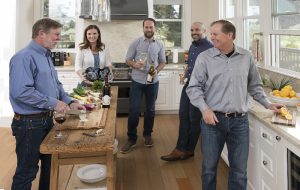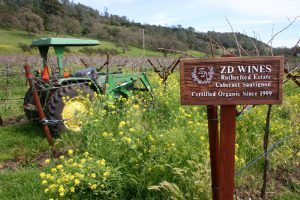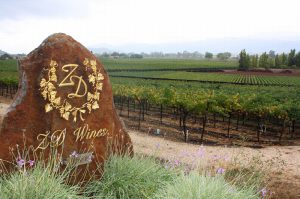
A recent photograph of the deLeuze Family

Certified Organic since 1999, ZD Wines also uses a biodiesel tractor to reduce their impact.

ZD Wines vineyards
For ZD Wines Sustainability is a Daily Endeavor
ZD Wines, a family-owned winery operated by the 2nd and 3rd generations of the deLeuze family, is celebrating 50 years in the Napa Valley. They are a perfect case study of how embracing sustainability can support production of great tasting, world-class wines.
This medium-sized winery has a commitment to sustainability that is clear in both its facility management practices and its staff awareness and engagement. The results of this commitment are borne out by data. Water use (for processing as well as administration and hospitality) falls within a desirable range of three to six gallons of water per gallon of wine produced. Total electricity use (both from the grid and via solar photovoltaic generation) shows remarkable efficiency of less than 10-kilowatt hours of electricity required per case of wine produced. The ZD waste diversion rate (percentage of “waste” recycled and composted) is now over 70%. Looking to replicate their results? Here’s how ZD achieves their resource savings:The name ZD comes from ‘Zero Defects.’ The ZD team applies this principle to not only their wines but day-to-day operations and how they use energy and water. It shows in their results.
- Bill Bennett, Program Engineer, Sustainable Napa County
Serious Solar Monitoring: When investing in a solar array, a common concern is getting the most return for the up-front capital expense. If systems are not regularly monitored, an inverter could fail and not be noticed for months, leading to a very expensive “true-up” bill (the amount paid for electricity purchased from the grid). ZD Wines has staff dedicated to monitoring array performance regularly. This includes cleaning sections of the array to see if performance improves before cleaning the entirety of the system. The result is electricity generation that is still exceeding original projections.
Cool, Nighttime Air: ZD Wines utilizes nighttime air cooling effectively and allows cellar temperatures to float (with a target temperature of 70 degrees). Consequently, cellar cooling is only needed for two to three months of the year when the cellar for white wines is lowered to 47 degrees.
Using the Right Lights: ZD has upgraded all metal halide high bay lighting to high-efficiency lighting and is phasing-in an upgrade of T-8 lamps to LED lamps and drivers. They have utilized available rebates to tighten the ROI timeline.
EV Charging Readily Available: ZD has six EV charging stations available for use by both employees and guests. The availability of EV charging infrastructure motivated several ZD staff members to purchase electric vehicles, and there are now nine staff EVs that rotate through the stations.
We look at the long-term impact of our decisions, both for our family today and the generations to come. Sustainable practices aren’t only the right thing to do, they also make fiscal sense. From solar generation to fewer inputs in our vineyards to reusing wastewater, being mindful of our footprint means costs savings over time.
- Robert deLeuze, CEO/Director of Wine Making, ZD Wines
High Pressure, Low Flow: ZD Wines has a custom-designed fixed high-pressure and low-flow water cleaning system for tanks and floors. They also have a progressive tank cleaning process which uses only a two-step cleaning system unless a tank has heavy sediment.
Lowering the Temps: The hot water temperature is set at 120 degrees facility-wide, and portable heaters are used to boost temperature selectively as needed.
Efficient Treatment: Well water is treated through simple filtration and UV sterilization. The filtration is done via a pleated cartridge filter that is not back-flushed, which is a source of additional water savings.
Soak and Save: New barrels are hydrated by filling with cold water and soaking for 24 hours. This water can be reused once for additional barrel hydration.
ZD Wines is not only comprehensively certified in both the Napa Green Land and Winery programs but has also achieved organic certification for 40 acres of estate vineyards and participates in the California Certified Sustainable Winegrowing program.
Our commitment to our ecological approach to business and life comes from our understanding that we only have one earth and we need to take care of it!
- Robert deLeuze, CEO/Director of Wine Making, ZD Wines
I applaud all vineyards and wineries that achieve Napa Green certification for their commitment to conservation and care for our community.
- Brad Wagenknecht, Napa County Supervisor
